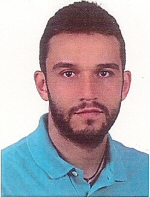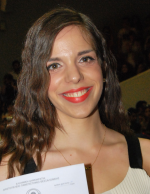Previous Group Members
 |
Ifigeneia Athanasiadou My research interests are in the fields of Experimental Cognitive Linguistics, Cognitive Grammar, First Language Acquisition, as well as Linguistic Relativity. My main research focuses on cognitive linguistic approaches to cross-linguistic first language acquisition and to the dynamic relationship between language acquisition and conceptual development. In my doctoral thesis, a cognitive approach is aimed at the effects of cross-linguistic grammatical number marking on nonverbal classification preferences in first language acquisition. more ... |
 |
Angeliki Alvanoudi Angeliki Alvanoudi is a sociolinguist specializing in language and gender, language contact, and language in interaction. She has taught courses in Sociolinguistics, Pragmatics, Discourse Analysis, and Gender and Language at the School of English, Aristotle University of Thessaloniki, and she is a Research Associate at the Institute of Modern Greek Studies. In April 2013, she graduated with a PhD from the Aristotle University of Thessaloniki. In May 2013, she took up a two year Postdoctoral Fellowship at the Language and Culture Research Centre, James Cook University, to examine the Greek variety spoken by immigrant communities in Far North Queensland, Australia. She has written the books Grammatical gender in interaction: Cultural and cognitive aspects published with Brill in 2015, and Modern Greek in diaspora: An Australian perspective published with Palgrave Pivot in 2019. She has published articles in various journals including Gender and Language, the Journal of Greek Linguistics, Text & Talk, Pragmatics, the Journal of Pragmatics, the Journal of Pidgin and Creole Languages and Oceanic Linguistics. more ... |
 |
Georgios Amoiridis Ever since I’ve taken my first courses in linguistics in my BA I’ve been skeptical about how formalism can “oppress” such a creative process as language or how the levels of linguistic analysis can be seen as -fairly- distinct from each other. Couple of years later, in my MA, I had my first course in Cognitive Linguistics. Naturally a theory that encompasses everything I believe about how language is actually at interplay with our experiences and how form is just a way of conveying meaning has enchanted me “beyond hope”. More specifically I’m interested in how a linguistic community conceptualizes and expresses reality diachronically and dialectically (Cognitive Linguistics from a Historicodialectal Perspective), while at the same time trying to see if what is theoretically stipulated, is also biologically justifiable (by carrying out relevant psycho- and neurolinguistic experiments). more ... |
 |
Alexandros Vagenas My work relates to the framework of Cognitive Linguistics and particularly the way language interacts with thought. Of great interest to me is the investigation of cognitive processes such as metaphor, metonymy and blending. Moreover, pragmatics also draws my attention; specifically, I place central emphasis to the pragmaticity of the afore-mentioned conceptual and linguistic processes. Additional areas of research are Psycholinguistics and language acquisition. I am currently member of the World Organization for Early Childhood Education. more ... |
 |
Lydia Vlastou
I have always found language and the way people use it fascinating but I never imagined that there was a specific linguistic field that explained the relation between human cognition and language production. I was introduced to Cognitive Linguistics during my undergraduate studies and I became familiarized with this area of research as a postgraduate student. My research interests include the metaphorical framing and its effect in shaping public discourse, the relation between language, gender and cognition, as well as the language of emotions. Other research interests are related to the cognitive approach to polite and impolite language, the persuasive effect of metaphor and the sociolinguistic approach to slang. more ... |
 |
Zoe Gerontidou During my undergraduate studies, the fields of Semantics and Historical Linguistics drew my attention. Historical Linguistics introduced me to how meanings change diachronically. As an MA student, I had my first Cognitive Linguistics class and I had the chance to go deeper and also see how Cognitive and Historical Linguistics are related to each other. My academic interests are language change and in particular semantic change, metaphor and metonymy. Other areas that concern me are Phonology and Morphology, with respect to diachronic changes, and Sociolinguistics, especially the relation between gender and language. more ... |
 |
Zoi Gravani During my undergraduate studies at the Aristotle University of Thessaloniki, I attended my first courses in Cognitive Linguistics, which provided me with an enthralling insight into the relation of our conceptual system and language structure and use. Wanting to further my understanding of this framework, I am currently a postgraduate student at Lancaster University, pursuing an MA in Language and Linguistics. My main academic and research interests lie in the field of Language and Cognition and, in particular, in the role of conceptual metaphors in political and health discourse. Additional areas of interest include (inter)subjectivity and (inter)subjectification, and the (potential) bilingual advantage in cognitive control and cognitive reserve. more ... |
 |
Evaggelia Divrami My main interest in Cognitive Linguistics is the way and the circumstances under which Internet users tend to use Ironical and Sarcastic utterances when they participate in Online Dialogues, where they express their opinion on social issues. The Online platforms, especially those of Facebook and YouTube, constitute an appropriate space where individuals can be very creative in the words, emoticons and paralinguistic elements they choose to use so as to express their thoughts. The Ironical and Sarcastic utterances people use on those platforms in order to express (im)politeness towards any other individual are of particular interest to me. The study of Multi-modal Metaphor and Metonymy are fields of Cognitive Linguistics that attract my attention as well. Some other fields of Linguistic studies that arouse my interest are those of Socio-pragmatics, Semantics and Psycholinguistics. more ... |
 |
Maria Dimitropoulou I am currently an undergraduate student at Aristotle university of Thessaloniki pursuing a BA in English Language and Literature. The core of my academic interests falls within the scope of English language teaching and Corpus linguistics. I have also a growing interest in Cognitive linguistics and, particularly, its applications in second language learning and teaching. more ... |
 |
Maria Theodoropoulou Maria Theodoropoulou is Assistant Professor at the Linguistics Department of the School of Philology, Aristotle University of Thessaloniki, Greece. She holds a PhD (“On the experiential basis of fear”, 2001) from the same university. Her main research interests focus on the relationship between language and emotion, linguistics and psychoanalysis, metaphtonymy, as well as language acquisition and language policies. She has published several articles on these subjects in academic journals, edited collections and conference proceedings. Her book Treading the linguistic paths of fear was published in 2004 by Nissos publications, while a volume edited by her, entitled Licht und Wärme, Festschrift In Memory of A.-F. Christidis was published in 2008 by the Centre for the Greek Language. She has collaborated in the editing of various other volumes (e.g. Encyclopedic Guide for Language, 2001) and taken part as group member and director of various research projects conducted by the Centre for the Greek Language, the University of Athens and other institutions in Greece and abroad. more ... |
 |
Theodora Kakaroudi I have completed my undergraduate studies in pedagogy and now I am a postgraduate student in theoretical and applied linguistics at the school of English. During my undergraduate studies, I have taken courses on cognitive, discursive and social psychology. This fact made me develop an interest in cognition, in general, and in the development of schemata in relation to their social and cultural context. For this reason, I was drawn to the field of cognitive linguistics since many of my interests are related to this field. Currently, I try to study how digital media affect our schemata and psyche so that future linguistic implications can be researched. more ... |
 |
Sotiria Kalpachtsi My academic interests lie in the field of Cognitive Linguistics and, more specifically, in the interaction of Metonymy and Metaphor and Discourse Analysis mainly in political context and narratives. I, also, have a growing interest in domains regarding ESL and creative writing practices. more ... |
 |
Ioanna Karatsori My research interests focus on the framework of Cognitive Linguistics and on processes such as metaphor and metonymy. Of great interest to me is the investigation of such processes in various discourses, particularly in the political discourse. Adjectives and Cognitive Grammar are two areas that my research has been focusing on. Additionally, the teaching of English as a Foreign Language and its relationship to Cognitive Linguistics also draws my attention. more ... |
 |
Maria Karlovasili
As an undergraduate student in the English Department, language and style in media, gender studies and cognitive grammar drew my attention. Being an MA candidate in the field of Theoretical Linguistics of the School of English, I got the chance to learn more about language and cognitive structure. Writing my MA thesis on gendered figurative language in Greek media gave me the opportunity to combine all the study fields that intrigue me and look deeper not only in the way our mind works and experiences the multimodal world around us, but also in the construction of gender ideology in Greek community. Other areas that interest me are Neurolinguistics, Psycholinguistics and Sociolinguistics. more ... |
 |
Sonia Kefalidou My research interests include cognitive narratology, viewpoint phenomena, TV news narratives and the application of Conceptual Integration Theory to multimodal communication. More specifically, I am interested in the cognitive mechanisms facilitating the understanding of narratives, the construction of narrative meaning and narrativization processes. My Phd Thesis focuses on the application of Cognitive and Transmedial Narratology to the critical approach of TV news narratives. Aspects of my research include blending of viewpoints in TV news, the application of Langacker’s Cognitive Grammar to account for the ideological aspects of TV news discourse, subjectivity, intersubjectivity and metaphor/ metonymy. more ... |
 |
Athina Kikiopoulou My interest in Cognitive Linguistics is targeted towards Semantics and Syntax, and in the way syntactical principles rule thought and expression at the expense of meaning. I am also interested in polysemy and its cultural and cognitive limitations, its metaphorical/metonymic aspects, as well as the mapping of polysemous word meanings in the human brain, like image schemata. Other areas of study that I am intrested in include Neurolinguistics (localization of language processes) and Phonology. (phonological alterations, phonotactics, and suprasegmentals). |
 |
Vasiliki Kyriakou My interests focus mainly on Psycholinguistics, Syntax and Cognitive Linguistics. I have completed a supervised diploma thesis in the domain of Psycholinguistics, titled “Acquisition of References in Greek as a Mother Tongue in Narrative Development”, and a research paper (same domain), titled “Ambiguity in Lexical Decision Tasks”. I am also member of the research group “Me 2 glosses”. more ... |
 |
Marialena Lavda I have completed my undergraduate studies in Greek Philology, majoring in Linguistics, but it was in my postgraduate studies at the School of English, Aristotle University, that I got introduced to Cognitive Linguistics. This framework answered many of my questions about the relationship between us, humans, a product of our society and our experiences, and language. My interests also lie in historical linguistics and language change. Cognitive linguistics gave me a new perspective on language change and I am interested in delving into it in the future. more ... |
 |
Martha Lampropoulou My interests lie in the field of Cognitive Linguistics, Morphology and Language Acquisition. My doctoral research focuses on the cognitive process of metonymy and the way the aforementioned facilitates the acquisition of grammatical phenomena, and more specifically, the word formation process of derivation. I have worked as an English teacher for several years in private language centres and Vocational training schools, as well as a teaching assistant for first year University courses at the School of English, Aristotle University of Thessaloniki. Additionally, I served as an assistant editor in Mouton De Gruyter Open Publishing Company and since 2012 I have been an editorial board member of METBIB (Bibliography of Metaphor & Metonymy John Benjamins Publishing Company Online Resources). more ... |
|
|
Athanasios Litsos My main focus in Linguistics lies in the study of meaning, particularly Pragmatics, Sociolinguistics and Discourse Analysis with a special interest in the social construction of meaning and the relation of language to ideology. With regard to Cognitive Linguistics, attending courses like Cognitive English Grammar and Metaphor-Metonymy has triggered my interest in the role of metaphorical thinking in ideology and the figurative language employed by men and women in conversational interaction. more ... |
|
|
Tatjana Maksimovic
My interests focus on Cognitive and Construction Grammar. My research focuses on grammaticalization, cross-cultural differences in expressing grammatical phenomena and subjectivity. I am also interested in showcasing the potentials of metaphors and metonymies in providing a more integrated account and explanation for language change. Additional areas of interest are bilingualism and first language acquisition, as well as the way in which metaphors, metonymies and frames affect discourse. more ... |
 |
Vasiliki Nesi I am interested in Cognitive linguistics and in particular the relation between language and thought. I would like to compare and contrast cognitive and psycholinguistic methods in language processing. Psycholinguistics and language impairment are intriguing areas of research for me as far as language processing is concerned. more ... |
 |
Dimitra Niaouri
Among my principal academic interests is the field of Cognitive Linguistics. The relationship between language and thought, the hypothesis of language being the medium of thought and the differences appearing in the way speakers of different languages view the world, as a result of their different language, are of particular interest to me. Language and emotions along with metaphorical language use also draw my attention. Other fields of study that I am interested in, are those of Sociolinguistics and Neurolinguistics. more ... |
 |
Maria Papadopoulou Maria Papadopoulou is Associate Professor of Literacies and Language Education at the Department of Early Childhood Education at Aristotle University of Thessaloniki. She has served for 20 years at the University of Thessaly, Greece. Her research areas are: Language Learning and Teaching Second/foreign language acquisition, social semiotics, visual semiotics, multimodal texts’ analysis and multilateracies. She was Director of the lab: ‘Language and Culture’ at the University of Thessaly and Head of the Department for two years. For four years, she was Secretary of the board of the Hellenic Semiotics Society. She is Director of the Master Program ‘Language education for refugees and migrants’ at the Hellenic Open University. She has coordinated two (2) and participated in twenty (20) European and national research projects concerning language education, second/foreign language learning, language education for migrants, Technology assisted language learning, multiliteracies and teachers’ education. She has also developed resources for language learning. more ... |
 |
Dionysia Saratsli The areas of my research interests place central emphasis on the framework of Cognitive Linguistics, and specialize in processes like metaphor and metonymy. The field of psycholinguistics also draws my attention. Specifically, my work emphasizes areas like language acquisition, bilingualism and language impairment. Moreover, a core interest of my research investigates the way cognitive as well as psycholinguistic processes are connected to language learning and/or teaching. more ... |
 |
Vilelmini Touni I am currently in my 4rth year of studies at the English Language and Literature Department of AUTH. My interests include cognitive linguistics, pragmatics and the effect that language has on thought in various cultures. In addition, I am particularly interested in the cognitive processes our mind undergoes while we perceive or process the new information and I like noticing the differences between monolingual and bilingual speakers in conceptualization and classification. |
 |
Despoina Tsakiri My research interests focus on critical discourse analysis and how metaphors and metonymies contribute to the study of discourses, such as the discourse of financial crisis and the discourse of migration. Sociolinguistics, psycholinguistics and first/second language acquisition are additional areas of interest. more ... |
|
|
Kyriaki Tsapakidou The main focus of my research is on detecting the interrelation between language, emotion, and cognition, based on interdisciplinary perspectives which combine insights from the fields of Cognitive Linguistics/Cognitive Semantics, Emotion and Language, Corpus-Based Analysis, and Discourse Analysis. My thesis primarily explores the role of figurative (metaphor/ metonymy) language within emotive talk and more specifically the association of metaphorical language with the expression of emotional experience. I’m additionally interested in the investigation of the overall construction of emotive talk and the structural choices of grammatical constructions language users tend to make in order to maintain intersubjectivity within it. more ... |
 |
Aikaterini Tsaroucha
My academic interests lie in the field of Cognitive Sciences in general and more particularly in Cognitive Linguistics and space perception combined with cognitive perception and conceptualisation of architectural models. I also have an interest on the interaction of Metaphor and Metonymy and its impact on everyday life and on the meta-function of everyday speech. Other academic interests include the study on matters of implementing the linguistic and culture sciences and the pragmatic aspects and consequences of such an implementation, on the linguistic sector. Concerning literature, I am inclined to the study of post-modern literature and meta-fiction as well as to the study of the urban space in relation to the procedure of writing and to the cognitive processes it initiates. Translation has only recently become a possible aspect of my future job considerations. more ... |
 |
Efthymia Tsaroucha During my PhD studies I have attempted to build bridges among various ‘islands’ of the Cognitive Linguistics ‘archipelago’ such as Cognitive Grammar, Construction Grammar, CMT and Frame Semantics. I have investigated the evocation of the literal and the figurative meanings of the grammatical category of English phrasal verbs. The area of Critical Discourse Analysis (advertising, media and political discourse) draws my attention. I am currently working on an interdisciplinary approach to Internet marketing and I investigate the case of social media. My current research attempts to build bridges among the disciplines of marketing, advertising and (Cognitive) Linguistics. The research suggests that multimodality serves as a marketing communication strategy. Conceptual blending is the primary cognitive tool I use in my post doctoral research. more ...
|
 |
Asterios Chardalias My incessant quest for meaning drives all my linguistic investigations, with good old Philosophy of Language to get me cranking and Pragmatics to keep me focused on the stuff that matters. In a time when available information is rapidly growing larger and richer than the human mind can individually handle, the need to develop methodologies that could lighten the load appears to be imperative. So, I am inquiring into ways of how Corpus-assisted Discourse Studies (CADS) and Computational Linguistics can inform the Cognitive Linguistics paradigm. more ... |
|
|
Alexandra Christakidou My research interests lie in the fields of Language of Emotions, Cognitive Linguistics and Cognitive Poetics. My research theme focuses on the conceptual and linguistic strategies for the expression of emotions in poetry. Some main aspects of my current investigation on poetry have to do with conceptual metaphors, metonymies, conceptual blending, synaesthesia, expressivity and contrast. more ... |
|
|
Kaitlyn Waters My undergraduate research brought me to Santiago Juxtlahuaca, Oaxaca, Mexico to conduct interviews with speakers of indigenous languages and create a thesis which highlights the representation and identity of indigenous language speakers in today's Mexican socio-political society. Following a one-year English teaching fellowship at the American Farm School, I've chosen to pursue my education at Aristotle University as an M.A. student in Risk Communication and Crisis Journalism to hone my skills in discourse and representation of power through language. more ... |